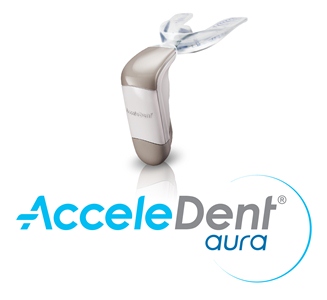
Introducing the AcceleDent® System
 Groundbreaking technology in orthodontic care
Groundbreaking technology in orthodontic care
Introducing the AcceleDent System, the first and only orthodontic micropulse device. AcceleDent, an FDA-cleared Class II medical device, complements conventional fixed braces with compelling clinical results — significantly faster treatment times and reduced patient discomfort — with only 20 minutes of use per day. Leveraging established clinical technology in orthopedic bone remodeling, AcceleDent generates precisely calibrated micropulses to accelerate tooth movement and reduce treatment time.
AcceleDent advances the science of orthodontic care to a new level:
- Tooth movement is accelerated by 106% during initial alignment and up to 50% during closure of extraction space—potentially shortening conventional orthodontic treatment time by 5 months.
- Safety was demonstrated in U.S. trials at two orthodontic programs with no evidence of increased root resorption, no serious adverse events, and no difference in loss of posterior anchorage.
- AcceleDent has over 2 years of international clinical experience in private practice.
Digital Radiology
In order to provide our patients with the highest quality of dental services, we use dental radiographs, or x-rays, in our office. These radiographs provide us with invaluable information about your oral and dental health.
While radiographic equipment does produce radiation (and depends on that radiation to function properly), modern advances in technology are continually reducing the amount of radiation that is produced. In fact, studies have shown that the amount of radiation produced by these machines is not significantly higher than other "normal" sources of radiation that we are exposed to on perhaps a daily basis, such as televisions and airplanes.
X-rays work on a simple principle: the X-rays are stimulated and sent through the mouth. When these rays pass through, they are absorbed more by the bones in your mouth than the gums and other soft tissues, creating a picture of how the teeth inside your mouth are positioned, as well as any potential areas of weakness or decay in your teeth.
While this radiation is very low, it is still recommended that pregnant women avoid any unnecessary X-rays. However, pregnant women are also more vulnerable to gum disease, so x-rays may be recommended, in which case proper precautions should be taken, such as using a lead apron and thyroid collar.

